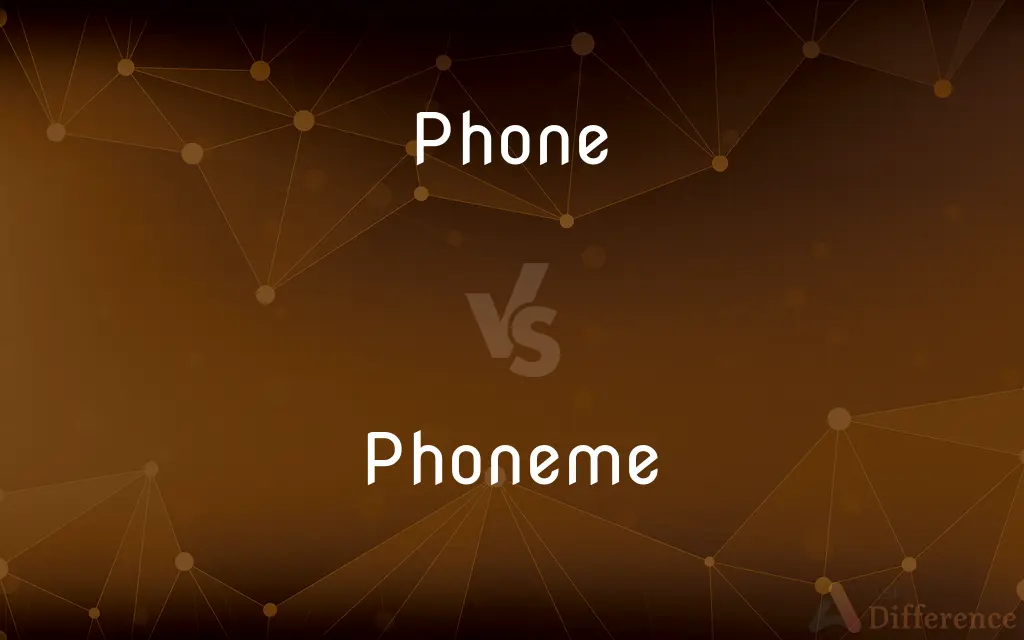Phone vs. Phoneme — What's the Difference?
Edited by Tayyaba Rehman — By Fiza Rafique — Updated on March 22, 2024
A phone is a distinct speech sound in its physical reality, while a phoneme is an abstract unit of sound in a language that can change meaning.

Difference Between Phone and Phoneme
Table of Contents
ADVERTISEMENT
Key Differences
A phone represents any distinct sound made during speech, regardless of the linguistic context, focusing on the actual sound produced. This includes variations in pronunciation that may not affect meaning. On the other hand, a phoneme is a conceptual sound unit within a language that distinguishes meanings. Phonemes are abstract representations of sounds that do not account for the variations in pronunciation (allophones) that a speaker might produce.
Phonetically, phones are identified and described based on their acoustic and articulatory properties, such as place of articulation, manner of articulation, and voicing. These characteristics are objectively measurable and are used to catalog the wide variety of sounds humans can produce. Whereas, phonemes are identified by their function within a specific language to differentiate meaning between words. For example, the phonemes /p/ and /b/ in English distinguish "pat" from "bat."
The study of phones falls under the field of phonetics, which is concerned with the physical aspects of speech sounds, including their production, transmission, and perception. Phonetics aims to understand and categorize the sounds of speech in all languages. Conversely, the study of phonemes belongs to phonology, a subfield of linguistics that deals with how speech sounds function within a particular language or dialect, including the rules governing their distribution and combination.
In practice, the transcription of phones is done using square brackets [ ] to represent the sounds as they are physically produced, reflecting the actual pronunciation, including regional or individual variations. Phonemes, however, are transcribed using slashes / /, indicating the abstract sound units without specifying the phonetic details of their pronunciation.
Understanding the distinction between phones and phonemes is crucial for language learning and teaching, as it highlights the difference between merely producing sounds and using those sounds effectively to convey meaning in a language. For language learners, mastering the phonemic inventory of a language is essential for clear communication, while being aware of phonetic variations (phones) helps in developing listening skills and pronunciation.
ADVERTISEMENT
Comparison Chart
Definition
A distinct speech sound as physically produced.
An abstract unit of sound that distinguishes meanings.
Study Field
Phonetics, focusing on sound's physical aspects.
Phonology, concentrating on sounds' function in language.
Importance
Describes how sounds are made and heard.
Distinguishes word meanings within a language.
Transcription
Uses square brackets [ ], denoting actual sounds.
Uses slashes / /, indicating abstract sound units.
Examples
[p] in "spin" vs. [pʰ] in "pin" (aspirated p).
/p/ in "pat" vs. /b/ in "bat", differentiating words.
Compare with Definitions
Phone
Each variation of a sound in speech is considered a different phone.
The aspirated [pʰ] is a different phone from the unaspirated [p].
Phoneme
Each language has a specific set of phonemes.
Some phonemes in other languages do not exist in English, like the rolled /r/.
Phone
It refers to the physical aspect of speech sounds.
The phone [k] can be aspirated or unaspirated, depending on its position in a word.
Phoneme
It represents abstract categories of sound.
The English phoneme /t/ includes slightly different sounds, all perceived as t.
Phone
A phone is a sound produced in spoken language, observed without linguistic interpretation.
The phone [t] varies slightly in pronunciation across different dialects.
Phoneme
Phonemes are central to the study of phonology.
Phonology examines how phonemes organize within languages to convey meanings.
Phone
Phones are cataloged based on their articulatory properties.
The phone [s] is a sibilant fricative, produced by directing air flow through the teeth.
Phoneme
Understanding phonemes is crucial for language learning.
Distinguishing the phonemes /ɛ/ and /æ/ is important for non-native English speakers.
Phone
The study of phones encompasses all sounds made in human languages.
Phonetic analysis reveals the rich diversity of phones across languages.
Phoneme
A phoneme is the smallest unit of sound that can change meaning in a language.
The phonemes /p/ and /b/ distinguish pad from bad.
Phone
A telephone.
Phoneme
In phonology and linguistics, a phoneme is a unit of sound that can distinguish one word from another in a particular language. For example, in most dialects of English, with the notable exception of the West Midlands and the north-west of England, the sound patterns (sin) and (sing) are two separate words that are distinguished by the substitution of one phoneme, /n/, for another phoneme, /ŋ/.
Phone
A speech sound considered without reference to its status as a phoneme or an allophone in a language.
Phoneme
Any of the perceptually distinct units of sound in a specified language that distinguish one word from another, for example p, b, d, and t in the English words pad, pat, bad, and bat.
Phone
To make or try to make a telephone connection with; place a call to.
Phoneme
The smallest phonetic unit in a language that is capable of conveying a distinction in meaning, as the m of mat and the b of bat in English.
Phone
To dial (a specific number)
Phone 411 for directory assistance.
Phoneme
An indivisible unit of sound in a given language. A phoneme is an abstraction of the physical speech sounds (phones) and may encompass several different phones.
Phone
To impart (information or news, for example) by telephone.
Phoneme
(linguistics) one of a small set of speech sounds that are distinguished by the speakers of a particular language
Phone
To telephone.
Phone
A device for transmitting conversations and other sounds in real time across distances, now often a small portable unit also capable of running software etc.
Daragh's on the phone at the moment. He'll call you when he's finished.
My phone ran out of battery.
There's an old-fashioned phone in the doctor's waiting room - it doesn't work anymore, of course.
Phone
(phonetics) A speech segment that possesses distinct physical or perceptual properties, considered as a physical event without regard to its place in the phonology of a language.
Phone
(transitive) To call (someone) using a telephone.
Phone me as soon as you land at the airport.
Phone
Colloq. for Telephone.
Phone
A speech sound.
Phone
Electronic equipment that converts sound into electrical signals that can be transmitted over distances and then converts received signals back into sounds;
I talked to him on the telephone
Phone
(phonetics) an individual sound unit of speech without concern as to whether or not it is a phoneme of some language
Phone
Electro-acoustic transducer for converting electric signals into sounds; it is held over or inserted into the ear;
It was not the typing but the earphones that she disliked
Phone
Get or try to get into communication (with someone) by telephone;
I tried to call you all night
Take two aspirin and call me in the morning
Common Curiosities
What role do phonemes play in language?
Phonemes are crucial for differentiating meanings between words in a language, forming the basis of the language's sound system.
How are phones different from phonemes?
Phones are the actual speech sounds produced, while phonemes are the abstract, meaningful sound units in a language.
What is a phoneme?
A phoneme is an abstract unit of sound in a language that serves to distinguish between meanings of words.
What is the difference between phonetics and phonology?
Phonetics deals with the physical aspects of speech sounds, while phonology focuses on how sounds function within the linguistic system of a particular language.
What is a phone in linguistics?
A phone is any distinct sound produced in speech, analyzed in terms of its physical properties without considering its linguistic function.
Why is the study of phones important?
Studying phones helps understand the physical aspects of speech sounds, including how they are produced and perceived.
How are phones transcribed?
Phones are transcribed using square brackets [ ], indicating the sounds as they are actually produced.
Why might a phoneme in one language be a phone in another?
Because what constitutes a meaningful sound difference (phoneme) varies by language, a sound may distinguish meanings in one language but not in another, making it a phoneme in the first and merely a phone in the second.
What is an example of a phone?
An example of a phone is the aspirated [pʰ] sound in "pin," which is physically distinct from the unaspirated [p] in "spin."
How are phonemes transcribed?
Phonemes are transcribed using slashes / /, representing the abstract sound units without specifying their phonetic details.
Can the same phone represent different phonemes in different languages?
Yes, the same phone can be part of different phonemes in different languages, depending on how it functions within each language's sound system.
Can a single phoneme have multiple phones?
Yes, a single phoneme can have multiple phones (allophones), which are its variations in actual speech, depending on linguistic context.
How does understanding phonemes benefit language learners?
Understanding phonemes aids language learners in distinguishing meanings and improving pronunciation, essential for effective communication.
Share Your Discovery

Previous Comparison
PVP vs. PVE
Next Comparison
Therein vs. TherewithAuthor Spotlight
Written by
Fiza RafiqueFiza Rafique is a skilled content writer at AskDifference.com, where she meticulously refines and enhances written pieces. Drawing from her vast editorial expertise, Fiza ensures clarity, accuracy, and precision in every article. Passionate about language, she continually seeks to elevate the quality of content for readers worldwide.
Edited by
Tayyaba RehmanTayyaba Rehman is a distinguished writer, currently serving as a primary contributor to askdifference.com. As a researcher in semantics and etymology, Tayyaba's passion for the complexity of languages and their distinctions has found a perfect home on the platform. Tayyaba delves into the intricacies of language, distinguishing between commonly confused words and phrases, thereby providing clarity for readers worldwide.
















































